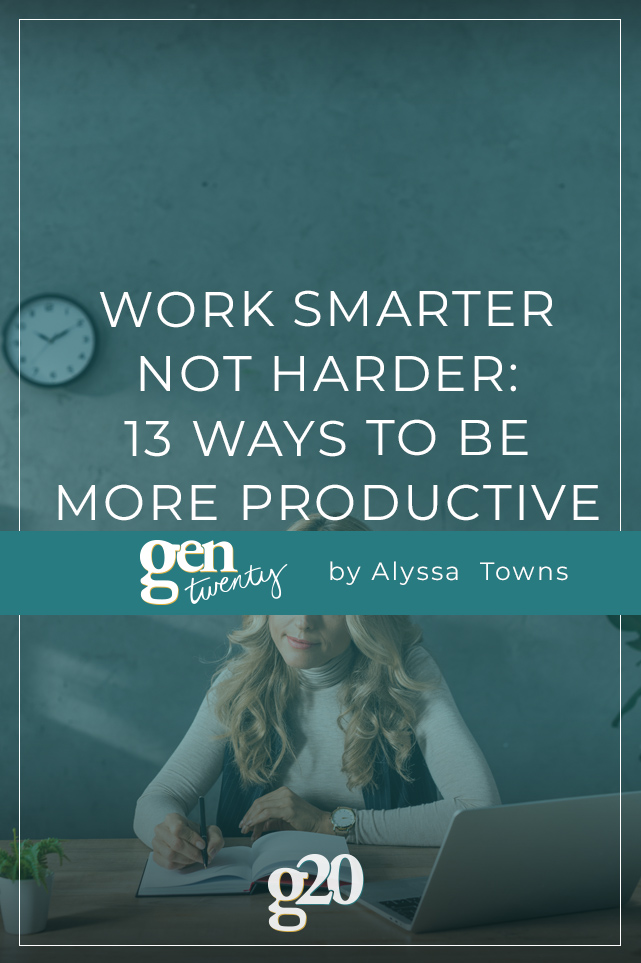Do you ever have one of those moments where you’re impressed by how much you accomplished in a short time? Have you thought about ways to be more productive so you can work smarter, not harder?
There’s nothing like getting into your flow state and doing your best, most productive work, only to walk away feeling extremely accomplished.
When these bursts of activity happen for me, I pause to think about the scenario and what factors might have helped me be productive because if there’s one thing it seems we’re all trying to achieve these days — it’s to do more in less time.

Work Smarter Not Harder: 13 Ways to be More Productive
1. Turn off notifications.
Even if you don’t get a lot of notifications, turning them completely off so you can focus is a game changer. I catch myself reaching to check my phone more times than I count, but as soon as I put it in “Do Not Disturb” mode, I almost forget it exists entirely and can go hours without reaching for it.
So turn off notifications on your phone, email, desktop, and anywhere else that might suddenly distract you. And for bonus points, put your electronic devices in another room after you silence them.
2. Build breaks into your work, so you know when to expect them.
Do you ever have one of those days that drag on with no remorse? Your to-do list is lengthy, but your momentum is slow, and you can’t wait for the day to end?
When you get ready to jump into your tasks for the day, schedule breaks the same way you do your other tasks and stick to them. Having these time blocks will give you something to look forward to and provides an opportunity to reset throughout the day for a quick energy boost.
3. Batch similar tasks to prevent task switching.
You might think you’re great at switching tasks and can multitask effectively, but you’d be surprised at how much quicker you can crank through your work when you batch your tasks. Batching tasks is simple — you schedule similar types of functions together within the same block of time.
Some areas to consider for your batches include: growth and self-development, administrative work (emails, etc.), and focused deep work, such as completing research and writing a blog post.
4. Set short (but still reasonable) deadlines.
According to Parkinson’s Law, “work expands so as to fill the time available for its completion.” What does this mean? Simply put, when we have more time to complete a project or task (say, a deadline that’s two weeks out), we tend to spread the project or task out and add layers of complexity unnecessarily.
Add in a few sprinkles of procrastination, and you have a recipe for disaster. However, you can combat Parkinson’s Law by setting and sticking to shorter deadlines. I often find that shorter deadlines help me stay motivated and produce higher quality (less rushed) work.
5. Develop a routine that works for you.
One of the greatest benefits of routines is that they help us work quicker and provide the opportunity to optimize what works best for us as individuals. If you do your best work in the early morning hours, focus on creating a solid morning routine that helps you accomplish your highest priority work.
The same goes for those of you who do your best work midday or late hours of the night. Take advantage of your rhythms and build routines around them.
6. Automate and outsource any tasks that you can to get them off your to-do list.
Automation is a game changer! Are you sending recurring emails? Automate them. And if you have tasks that you can’t automate but can’t afford to hold its spot on your to-do list — find ways to outsource those tasks.
Perhaps you hire a virtual assistant, or a social media manager, for example. Find the people you need to help you get the job done without having your hands in the pot.
7. Give the Pomodoro Technique a try.
The Pomodoro Technique is famous for its positive effect on productivity. If you’re unfamiliar with this technique, it’s relatively straightforward: work on one task for 25-minutes (set a timer), and then take a five-minute break.
After four Pomodoros, give yourself a more extended break, somewhere between 15-30 minutes. Try it out and see if it works for you.
8. Prioritize your to-do list.
Sure, all of your work is important. I feel the same way! But to build momentum, you need to prioritize your to-do list.
This will help ensure that you will (hopefully) have accomplished the most important things you needed to get done for the day if your day doesn’t go quite as planned. Set your priorities first thing in the morning and stick to them.
This is a great way to be more productive and also still prevent burnout.
9. Stop trying to produce “perfect” results.
Striving for perfectionism and over-editing or overthinking your work before finalizing it can be a huge time waster. If you struggle with producing excellent work, try to allow yourself more grace and remember that getting the task done is often a lot better than doing it perfectly.
10. Replace mindless phone scrolling with a task you’ve been putting off.
I’m not much of a TV watcher, but I like to have the TV on for noise purposes. Raise your hand if you’ve ever turned on the TV and then sat on the couch and mindlessly scrolled through your phone and called it your relaxation time? Yeah, me too.
Instead of scrolling through your phone, try doing small tasks that don’t always make their way to the top of the to-do list but would help you feel better (like cleaning your makeup brushes or organizing your important paperwork).

11. Don’t reinvent the wheel and use resources when starting something new.
Starting new projects or types of work is a great way to develop your skills and help you grow. But this level of development can come with a steep learning curve and can suck up a lot of your time.
So when starting something new, look for resources to help you get started rather than reinventing the wheel or starting from scratch. For example, when using a project management tool like Asana or Trello to track your projects, browse the template galleries to get new projects set up instead of building a brand new one.
12. Don’t work all the time.
A fast way to kill your productivity is to drown yourself in work as many hours of the day as possible. Instead, take time away from your projects and work.
Spend time entirely disconnected from your to-do list at least one full day per week. Go on vacation, or enjoy a staycation to refill your cup. And start and end the workday on time, so you still have enough time in your day left for you.
13. Take care of your physical and mental health.
When you feel good and have more energy, you’ll likely be more productive with ease. Add healthy meals and snacks along with exercise into your schedule to help you maximize your effectiveness.
Consider meal planning and exercising around the same time each day to keep you in a routine throughout the week.
And that’s a wrap! So get out there, productivity pioneer, and let us know which of these ways to be more productive you’re going to try.
More Posts on GenTwenty on Productivity:
- The 20 Best Podcasts for Productivity 2023
- How to Boost Your Productivity Using The Eisenhower Matrix
- The Fear of Success and Why It’s Limiting Your Productivity
- 5 Simple Ways to Increase Your Productivity
- 5 Productivity Hacks to Stay On Top of Your Game at Work
- 7 Life Lessons From Stephen Covey’s “The 7 Habits Of Highly Effective People”
- 31 Mental Health Activities In The Workplace
- 8 Simple Rituals To Help You Power Through Your Day
- How to Reset Your Habits and Routines This Spring
- 10 Things To Do When You’re Feeling Unproductive
- Work Smarter Not Harder: 13 Ways to be More Productive
- 31 Productive Things To Do When Bored at Work
- 6 Productive Things To Do When You’re In-Between Jobs
- 160 Quotes About Motivation For a Productive Day
- 70 Fun Team Meeting Ideas
- 25 Workplace Contest Ideas to Engage Your Team
- 6 Time Management Tips For Busy Young Professionals
- 45 Habits of Successful Women
Don’t forget to follow GenTwenty on Instagram, Pinterest, and Facebook for more life tips and hacks for your twenties!
More posts on self-care:
- How I Practice Self-Care And Set Boundaries At Work
- 42 Self-Care Apps That Go With You Anywhere [2023]
- 6 Self-Care and Self-Love Books to Read ASAP
- 37 Self-Care Ideas for a Rainy Spring Day
- The 8 Best Journals For Self-Care
- 100 Magical Self-Care Ideas To Start Immediately
- The GenTwenty Podcast Episode 5: Self-Care vs. Self-Soothers
- 7 Acts of Self-Care You May Not Realize Are Self-Care
- 30 Day Self-Care Challenge
- Therabox Review (The Gift of Self-Care Series)
- HopeBox Review (The Gift Of Self-Care Series)
- The Gift of Self-Care Part 3: Feeling Fab Review
- The Gift of Self-Care: MindWander Box Review
- The Gift of Self-Care: Which Is The Best Self-Care Box?
- 30 Day Self-Care Challenge
- Why Self-Care Isn’t A Waste Of Time
